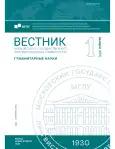Cancel Culture Discourse and Axiology: How and Why Mass Media Verbalize Values
- Authors: Arakelova A.1, Shiryaeva T.1
-
Affiliations:
- Пятигорский государственный университет
- Issue: No 1(895) (2025)
- Pages: 17-24
- Section: Linguistics
- URL: https://journal-vniispk.ru/2542-2197/article/view/279163
- ID: 279163
Cite item
Abstract
Cancel culture generates diverse communication and is grounded in the value systems accepted by society. To conduct a study of the written discourse of cancel culture, we have compiled a corpus of 40 articles published between 2019 and 2023. The aim of the study, conducted at the intersection of axiolinguistics and critical discourse analysis and with the help of corpus linguistics methods, was to form the axiological sphere of the discourse of cancel culture. As a result, 10 value concepts were identified: “Power”, “Freedom of Speech”, “Accountability”, “Ideas”, “Change”, “Unity”, “Social Justice”, “Voice”, “Respect”, “Inclusivity”. These value concepts are embodied through specific lexical-grammatical linguistic means and reflect the most important orientations, trends, and norms of Western society.
About the authors
Amaliya Arakelova
Пятигорский государственный университет
Author for correspondence.
Email: amaliia.arakelova@gmail.com
Russian Federation
Tatyana Shiryaeva
Пятигорский государственный университет
Email: shiryaevat@list.ru
References
- Halpern, D., Gibbs, J. (2013). Social media as a catalyst for online deliberation? Exploring the affordances of Facebook and YouTube for political expression. Computers in Human Behavior, 29, 1159–1168. 10.1016/j. chb.2012.10.008.
- Bouvier, G. (2020). Racist call-outs and cancel culture on Twitter: The limitations of the platform’s ability to define issues of social justice. Discourse, Context & Media, 38, 100431. 10.1016/j.dcm.2020.100431.
- Semenova, O. F. (2023). Cancel Culture – the Speech Behavior of Modern Society. Review of Business and Economics Studies, 11(1), 13–18. 10.26794/2308-944X-2023-11-1-13-18. (In Russ.)
- Shustova, S. V., Shipitsin, А. А. (2023). New vocabulary in the discursive practice of ‘Сancel Сulture’. Theoretical and Applied Linguistics, 9(3), 203–217. 10.22250/24107190_2023_9_3_203. (In Russ.)
- Mirzaeva, D. U. (2023). Is cancel culture culture? Human Being: Image and Essence. Humanitarian Aspects, 4(56), 59–75. 10.31249/chel/2023.04.04. (In Russ.)
- Dubinina, I. I. (2023). Axiological conflict as a potential trigger for the discourse practice of cancel culture (based on the updated dictionary entries “woman”/ “man” in the Cambridge Dictionary. Philology. Theory & Practice, 16(12), 4153–4159. 10.30853/phil20230631. (In Russ.)
- Van Dijk, T. A. (1993). Principles of critical discourse analysis. Discourse & Society, 4(2), 249–283. 10.1177/0957926593004002006.
- Wodak, R. (1995). Critical linguistics and critical discourse analysis. In Verschueren, J., Östman, J. O., Blommaert, J. (Eds.), Handbook of pragmatics manual (pp. 204–210). Amsterdam: John Benjamins.
- Chouliaraki, L., Fairclough, N. (1999). Discourse in late modernity: Rethinking critical discourse analysis. Edinburgh, Scotland: Edinburgh University Press.
- Williamson, K., Given, L. M., Scifleet, P. (2013). Qualitative data analysis. In Given, L. M. (Ed.), The Sage encyclopedia of qualitative research methods (pp. 699–702). Sage.
- Wodak, R., Meyer, M. (Eds.). (2009). Methods for critical discourse analysis. 2nd ed. London: Sage.
- Gorozhanov, A. I., Krasikova, E. A. (2024). Obtaining meaningful data from an unprepared text by automatically processing with author’s linguistic tools (based on the material of electronic Chinese media). Issues of applied linguistics, 54, 115–138. 10.25076/vpl.54.05.
- Gorozhanov, A. I. (2023). Building a linguistic corpus based on natural language processing tools: planning software solutions. Philology. Theory & practice, 16 (5), 1616–1620. 10.30853/phil20230252.
- Loginova, A. O., Gorozhanov, A. I., Aleynikova, D. V. (2023). Software tools for creating and analyzing a text data bank of short electronic messages from social network users. Philology. Theory & practice, 16(11), 3641–3647. 10.30853/ phil20230560.
- Popova, Z. D., Sternin, I. A. (2001). Interpretation field of the national concept and methods of its study. Kultura obshcheniya i yeye formirovanie, 8, 34–56 (In Russ.)
- Karasik, V. I. (2002). Yazykovoy krug: lichnost’, kontsepty, diskurs = Linguistic circle: Personality, concepts, discourse. Volgograd: Publishing House. (In Russ.)
Supplementary files










